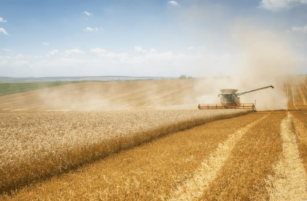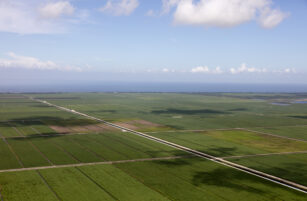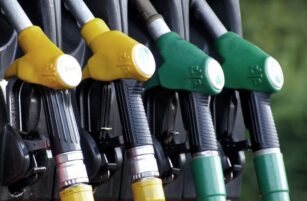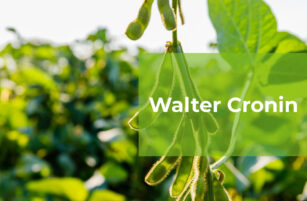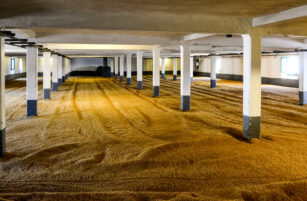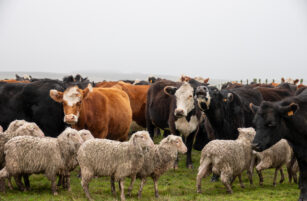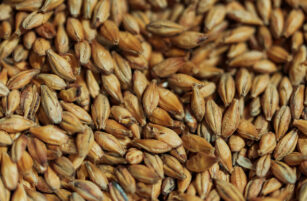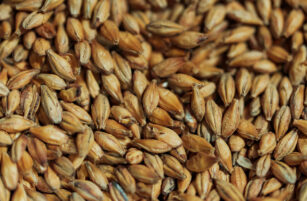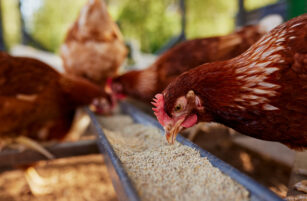Insight Focus
- Milk supply fears sparked by drought in France
- Ukrainian agricultural exports pick up on month but still behind last year’s
- India inaugurates its first ethanol plant to use rice straw as feedstock.
The Rhine in drought at Cologne

Source: Shutterstock
Water levels Europe’s most important inland waterway, the Rhine, is set to fall below 40 centimetres at the key choke-point of Kaub in Germany this week, according to forecasts from the Federal Waterways and Shipping Administration. Bloomberg reported that barge traffic is effectively impossible if the Rhine falls below that depth.
“German industry sees the danger that the low water levels will further diminish the capacity of an inland shipping industry which already has little leeway,” the Federal Association of German Industry (BDI) was quoted as saying by the Frankfurter Allgemeine Zeitung (in German). The BDI added that the situation could escalate very quickly and called for more government money to be made available for infrastructure projects.
“Rivers won’t become worthless for transport, but they are likely to become less reliable in the future,” Fred Hattermann, who studies hydroclimatic risks at the Potsdam Institute for Climate Impact Research, told Bloomberg. He added that “the ‘just in time’ model has come to an end. We need to build more buffers into our system.”
Danube hit too
On the Danube, emergency dredging operations are under way in Bulgaria, Romania and Serbia, and ships are backed up waiting for channels to be cleared, Bloomberg added. The most critical spots are in the Zimnicea area along the Romanian-Bulgarian border and farther down river in Cernavoda, which affects shipping to Ukraine.
“It’s the most serious situation we’ve had in the past 20 years,” Gabriel Techera, investor relations director at Transport Trade Services, Romania’s biggest river freight company, told the news agency.
Impact of Drought Felt Across Europe

Source: Shutterstock
In France, a shortage of fodder because of the drought meant there could be a shortage of milk in the months ahead, the National Federation of Farmers’ Unions said. The French corn harvest is expected to be 18.5% lower this year compared with 2021, the agriculture ministry has said, just as Europeans contend with higher food prices as a result of lower-than-normal grain exports from Russia and Ukraine, the European Supermarket Magazine reported.
In the UK, a drought has been declared across large parts of England including the key farming regions of East Anglia and Lincolnshire, the Guardian reported. It said that the group of experts meeting to take the decision were shown “harrowing” statistics about England’s food security. Half of the potato crop is expected to fail as it cannot be irrigated, and even crops that are usually drought tolerant such as maize have been failing.
The group was told “irrigation options are diminishing with reservoirs being emptied fast”, and losses of between 10% and 50% are expected for crops including carrots, onions, sugar beet, apples and hops. Milk production is also down nationally due to a lack of food for cows, and wildfires are putting large areas of farmland at risk, it added.
In Romania, Agriculture Minister Petre Daea said this year’s wheat harvest was 15-18% smaller than 2021’s record high 11.3m tonnes, European Supermarket Magazine reported. This will leave room for exports because domestic consumption is 2.5m-3.0m tonnes.
High temperatures and prolonged drought have affected crops, particularly maize and sunflower seeds, across Romania, and preliminary ministry data on Wednesday showed damage to 284,376 hectares out of roughly 7m ha of grain and oil-producing crops.
Ukrainian agricultural exports grow

Source: Shutterstock
Ukraine’s July exports of agricultural products rose 22.7% from June to 2.66m tonnes of agricultural products, the official Ukrinform news agency reported, citing the agriculture ministry. Wheat exports more than trebled on the month in July to about 412k tonnes from 138.4k tonnes. Sunflower oil exports rose by 39.4k tonnes in July to 307k. However, sunflower seed exports fell by nearly a third from June to 362.1k tonnes.
In a separate statement quoted by Reuters the ministry said Ukrainian grain exports were still down almost 52% year on year at 2.2m tonnes so far in the 2022/23 season.
Russia expects to produce more sugar

Source: Shutterstock
Staying in the former Soviet, Union, the Union of Russian Sugar Producers expects an 84% year-on-year rise in national sugar production in August, the first month of the 2022/23 season, to 370k tonnes, the Interfax news agency reported. Interfax quoted an earlier statement from the industry association as saying that Russia will be able to produce enough sugar to meet domestic demand and export to the former Soviet countries in the Eurasian Economic Union.
The news will come as a great relief to people in Kazakhstan where, as Eurasianet reports, sugar is in such short supply it is being used to bribe officials.
India opens new-generation ethanol plant
India opened its first plant to produce ethanol from rice straw or stubble as part of measures to reduce its reliance on oil imports and meet its net zero carbon goal, Reuters reported.
Prime Minister Narendra Modi said the project would help cut pollution in the capital, New Delhi, which has been blanketed by smog from stubble burning in recent winters, as well as in the northern states of Haryana and Punjab.
Oil Minister Hardeep Singh Puri said commercial production would begin in three months. The plant has an ethanol production capacity of 100k litres a day, Reuters said.

Source: Shutterstock
UAE state investor Mubadala Investment Co and energy company Raizen are in the final round to acquire Brazilian ethanol joint venture BP Bunge Bioenergia, the world’s third-largest sugarcane processor, Reuters reported, citing a source with knowledge of the matter.
Other Insights That May Be of Interest…
PET Supply Chains Groan Under Global Heatwaves



